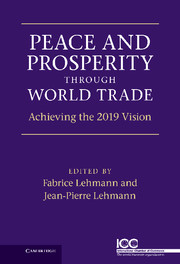Book contents
- Frontmatter
- Contents
- Notes on contributors
- Foreword
- Preface: the ICC vision
- Historical overview and dynamics
- Editorial note
- A Global systemic transformations
- B Governance of global trade
- C Poverty and global inequities
- D The long view on interlocking crises
- E Global business responsibilities
- Conclusion: the imperative of inclusive global growth
- Index
Conclusion: the imperative of inclusive global growth
Published online by Cambridge University Press: 05 July 2011
- Frontmatter
- Contents
- Notes on contributors
- Foreword
- Preface: the ICC vision
- Historical overview and dynamics
- Editorial note
- A Global systemic transformations
- B Governance of global trade
- C Poverty and global inequities
- D The long view on interlocking crises
- E Global business responsibilities
- Conclusion: the imperative of inclusive global growth
- Index
Summary
As the world enters the second decade of the twenty-first century and approaches the hundredth anniversary of the founding of the ICC, in 2019, there are good reasons why one should feel optimistic. In citing just a few, one would highlight the tremendous impact that information and communication technologies have had on society. The mobile phone has become ubiquitous in all parts of the world and has succeeded in reaching millions of people at the bottom of the pyramid, thereby improving productivity, connectivity and opportunities. Without by any means seeking to minimize the considerable geopolitical threats, comparatively speaking the world is at peace; there are fewer wars currently than at any time since the end of World War II. In particular, there can be hope that the imploding states that seemed endemic to Africa in the 1990s and early 2000s have stabilized and that the continent could be on the verge of sustained growth. China's trade and investments in Africa have contributed considerably to its greater integration in the global economy. Throughout the global South there is the emergence of a new ‘middle class’, which The Economist has estimated at some 1.2 billion people. And without doubt one very important reason for optimism is that the world economy seems to have withstood the greatest shock it has experienced since 1929. The global economic system, therefore, would appear to be resilient.
- Type
- Chapter
- Information
- Peace and Prosperity through World TradeAchieving the 2019 Vision, pp. 289 - 292Publisher: Cambridge University PressPrint publication year: 2010



